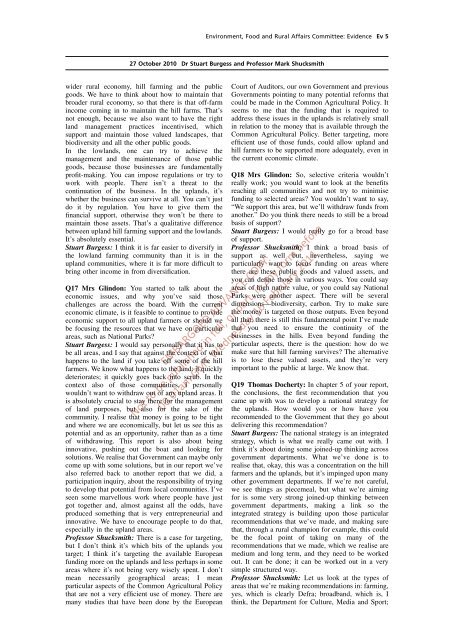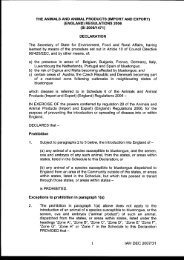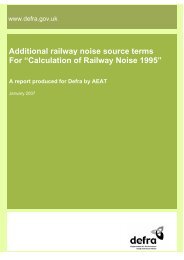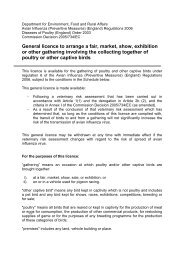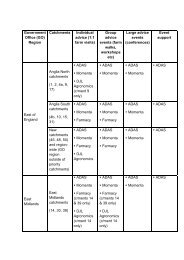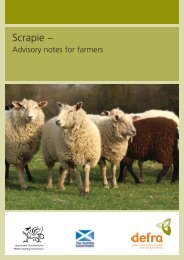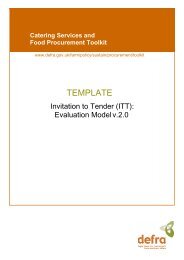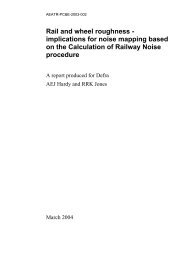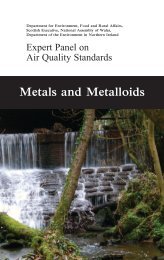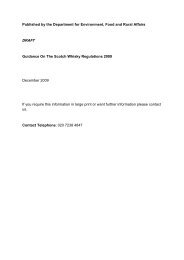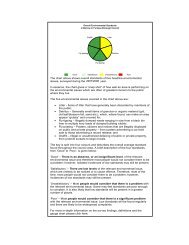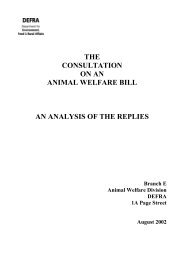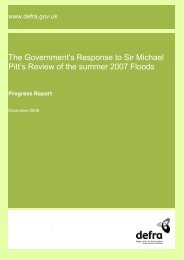Farming in the Uplands - ARCHIVE: Defra
Farming in the Uplands - ARCHIVE: Defra
Farming in the Uplands - ARCHIVE: Defra
You also want an ePaper? Increase the reach of your titles
YUMPU automatically turns print PDFs into web optimized ePapers that Google loves.
Environment, Food and Rural Affairs Committee: Evidence Ev 5<br />
27 October 2010 Dr Stuart Burgess and Professor Mark Shucksmith<br />
wider rural economy, hill farm<strong>in</strong>g and <strong>the</strong> public<br />
goods. We have to th<strong>in</strong>k about how to ma<strong>in</strong>ta<strong>in</strong> that<br />
broader rural economy, so that <strong>the</strong>re is that off-farm<br />
<strong>in</strong>come com<strong>in</strong>g <strong>in</strong> to ma<strong>in</strong>ta<strong>in</strong> <strong>the</strong> hill farms. That’s<br />
not enough, because we also want to have <strong>the</strong> right<br />
land management practices <strong>in</strong>centivised, which<br />
support and ma<strong>in</strong>ta<strong>in</strong> those valued landscapes, that<br />
biodiversity and all <strong>the</strong> o<strong>the</strong>r public goods.<br />
In <strong>the</strong> lowlands, one can try to achieve <strong>the</strong><br />
management and <strong>the</strong> ma<strong>in</strong>tenance of those public<br />
goods, because those bus<strong>in</strong>esses are fundamentally<br />
profit-mak<strong>in</strong>g. You can impose regulations or try to<br />
work with people. There isn’t a threat to <strong>the</strong><br />
cont<strong>in</strong>uation of <strong>the</strong> bus<strong>in</strong>ess. In <strong>the</strong> uplands, it’s<br />
whe<strong>the</strong>r <strong>the</strong> bus<strong>in</strong>ess can survive at all. You can’t just<br />
do it by regulation. You have to give <strong>the</strong>m <strong>the</strong><br />
f<strong>in</strong>ancial support, o<strong>the</strong>rwise <strong>the</strong>y won’t be <strong>the</strong>re to<br />
ma<strong>in</strong>ta<strong>in</strong> those assets. That’s a qualitative difference<br />
between upland hill farm<strong>in</strong>g support and <strong>the</strong> lowlands.<br />
It’s absolutely essential.<br />
Stuart Burgess: I th<strong>in</strong>k it is far easier to diversify <strong>in</strong><br />
<strong>the</strong> lowland farm<strong>in</strong>g community than it is <strong>in</strong> <strong>the</strong><br />
upland communities, where it is far more difficult to<br />
br<strong>in</strong>g o<strong>the</strong>r <strong>in</strong>come <strong>in</strong> from diversification.<br />
Q17 Mrs Gl<strong>in</strong>don: You started to talk about <strong>the</strong><br />
economic issues, and why you’ve said those<br />
challenges are across <strong>the</strong> board. With <strong>the</strong> current<br />
economic climate, is it feasible to cont<strong>in</strong>ue to provide<br />
economic support to all upland farmers or should we<br />
be focus<strong>in</strong>g <strong>the</strong> resources that we have on particular<br />
areas, such as National Parks?<br />
Stuart Burgess: I would say personally that it has to<br />
be all areas, and I say that aga<strong>in</strong>st <strong>the</strong> context of what<br />
happens to <strong>the</strong> land if you take off some of <strong>the</strong> hill<br />
farmers. We know what happens to <strong>the</strong> land: it quickly<br />
deteriorates; it quickly goes back <strong>in</strong>to scrub. In <strong>the</strong><br />
context also of those communities, I personally<br />
wouldn’t want to withdraw out of any upland areas. It<br />
is absolutely crucial to stay <strong>the</strong>re for <strong>the</strong> management<br />
of land purposes, but also for <strong>the</strong> sake of <strong>the</strong><br />
community. I realise that money is go<strong>in</strong>g to be tight<br />
and where we are economically, but let us see this as<br />
potential and as an opportunity, ra<strong>the</strong>r than as a time<br />
of withdraw<strong>in</strong>g. This report is also about be<strong>in</strong>g<br />
<strong>in</strong>novative, push<strong>in</strong>g out <strong>the</strong> boat and look<strong>in</strong>g for<br />
solutions. We realise that Government can maybe only<br />
come up with some solutions, but <strong>in</strong> our report we’ve<br />
also referred back to ano<strong>the</strong>r report that we did, a<br />
participation <strong>in</strong>quiry, about <strong>the</strong> responsibility of try<strong>in</strong>g<br />
to develop that potential from local communities. I’ve<br />
seen some marvellous work where people have just<br />
got toge<strong>the</strong>r and, almost aga<strong>in</strong>st all <strong>the</strong> odds, have<br />
produced someth<strong>in</strong>g that is very entrepreneurial and<br />
<strong>in</strong>novative. We have to encourage people to do that,<br />
especially <strong>in</strong> <strong>the</strong> upland areas.<br />
Professor Shucksmith: There is a case for target<strong>in</strong>g,<br />
but I don’t th<strong>in</strong>k it’s which bits of <strong>the</strong> uplands you<br />
target; I th<strong>in</strong>k it’s target<strong>in</strong>g <strong>the</strong> available European<br />
fund<strong>in</strong>g more on <strong>the</strong> uplands and less perhaps <strong>in</strong> some<br />
areas where it’s not be<strong>in</strong>g very wisely spent. I don’t<br />
mean necessarily geographical areas; I mean<br />
particular aspects of <strong>the</strong> Common Agricultural Policy<br />
that are not a very efficient use of money. There are<br />
many studies that have been done by <strong>the</strong> European<br />
Court of Auditors, our own Government and previous<br />
Governments po<strong>in</strong>t<strong>in</strong>g to many potential reforms that<br />
could be made <strong>in</strong> <strong>the</strong> Common Agricultural Policy. It<br />
seems to me that <strong>the</strong> fund<strong>in</strong>g that is required to<br />
address <strong>the</strong>se issues <strong>in</strong> <strong>the</strong> uplands is relatively small<br />
<strong>in</strong> relation to <strong>the</strong> money that is available through <strong>the</strong><br />
Common Agricultural Policy. Better target<strong>in</strong>g, more<br />
efficient use of those funds, could allow upland and<br />
hill farmers to be supported more adequately, even <strong>in</strong><br />
<strong>the</strong> current economic climate.<br />
Q18 Mrs Gl<strong>in</strong>don: So, selective criteria wouldn’t<br />
really work; you would want to look at <strong>the</strong> benefits<br />
reach<strong>in</strong>g all communities and not try to m<strong>in</strong>imise<br />
fund<strong>in</strong>g to selected areas? You wouldn’t want to say,<br />
“We support this area, but we’ll withdraw funds from<br />
ano<strong>the</strong>r.” Do you th<strong>in</strong>k <strong>the</strong>re needs to still be a broad<br />
basis of support?<br />
Stuart Burgess: I would really go for a broad base<br />
of support.<br />
Professor Shucksmith: I th<strong>in</strong>k a broad basis of<br />
support as well but, never<strong>the</strong>less, say<strong>in</strong>g we<br />
particularly want to focus fund<strong>in</strong>g on areas where<br />
<strong>the</strong>re are <strong>the</strong>se public goods and valued assets, and<br />
you can def<strong>in</strong>e those <strong>in</strong> various ways. You could say<br />
areas of high nature value, or you could say National<br />
Parks were ano<strong>the</strong>r aspect. There will be several<br />
dimensions—biodiversity, carbon. Try to make sure<br />
<strong>the</strong> money is targeted on those outputs. Even beyond<br />
all that, <strong>the</strong>re is still this fundamental po<strong>in</strong>t I’ve made<br />
that you need to ensure <strong>the</strong> cont<strong>in</strong>uity of <strong>the</strong><br />
bus<strong>in</strong>esses <strong>in</strong> <strong>the</strong> hills. Even beyond fund<strong>in</strong>g <strong>the</strong><br />
particular aspects, <strong>the</strong>re is <strong>the</strong> question: how do we<br />
make sure that hill farm<strong>in</strong>g survives? The alternative<br />
is to lose <strong>the</strong>se valued assets, and <strong>the</strong>y’re very<br />
important to <strong>the</strong> public at large. We know that.<br />
Q19 Thomas Docherty: In chapter 5 of your report,<br />
<strong>the</strong> conclusions, <strong>the</strong> first recommendation that you<br />
came up with was to develop a national strategy for<br />
<strong>the</strong> uplands. How would you or how have you<br />
recommended to <strong>the</strong> Government that <strong>the</strong>y go about<br />
deliver<strong>in</strong>g this recommendation?<br />
Stuart Burgess: The national strategy is an <strong>in</strong>tegrated<br />
strategy, which is what we really came out with. I<br />
th<strong>in</strong>k it’s about do<strong>in</strong>g some jo<strong>in</strong>ed-up th<strong>in</strong>k<strong>in</strong>g across<br />
government departments. What we’ve done is to<br />
realise that, okay, this was a concentration on <strong>the</strong> hill<br />
farmers and <strong>the</strong> uplands, but it’s imp<strong>in</strong>ged upon many<br />
o<strong>the</strong>r government departments. If we’re not careful,<br />
we see th<strong>in</strong>gs as piecemeal, but what we’re aim<strong>in</strong>g<br />
for is some very strong jo<strong>in</strong>ed-up th<strong>in</strong>k<strong>in</strong>g between<br />
government departments, mak<strong>in</strong>g a l<strong>in</strong>k so <strong>the</strong><br />
<strong>in</strong>tegrated strategy is build<strong>in</strong>g upon those particular<br />
recommendations that we’ve made, and mak<strong>in</strong>g sure<br />
that, through a rural champion for example, this could<br />
be <strong>the</strong> focal po<strong>in</strong>t of tak<strong>in</strong>g on many of <strong>the</strong><br />
recommendations that we made, which we realise are<br />
medium and long term, and <strong>the</strong>y need to be worked<br />
out. It can be done; it can be worked out <strong>in</strong> a very<br />
simple structured way.<br />
Professor Shucksmith: Let us look at <strong>the</strong> types of<br />
areas that we’re mak<strong>in</strong>g recommendations <strong>in</strong>: farm<strong>in</strong>g,<br />
yes, which is clearly <strong>Defra</strong>; broadband, which is, I<br />
th<strong>in</strong>k, <strong>the</strong> Department for Culture, Media and Sport;<br />
EMBARGOED ADVANCE COPY:<br />
Not to be published <strong>in</strong> full, or part, <strong>in</strong> any form before<br />
00.01am GMT Wednesday 16 February 2011


